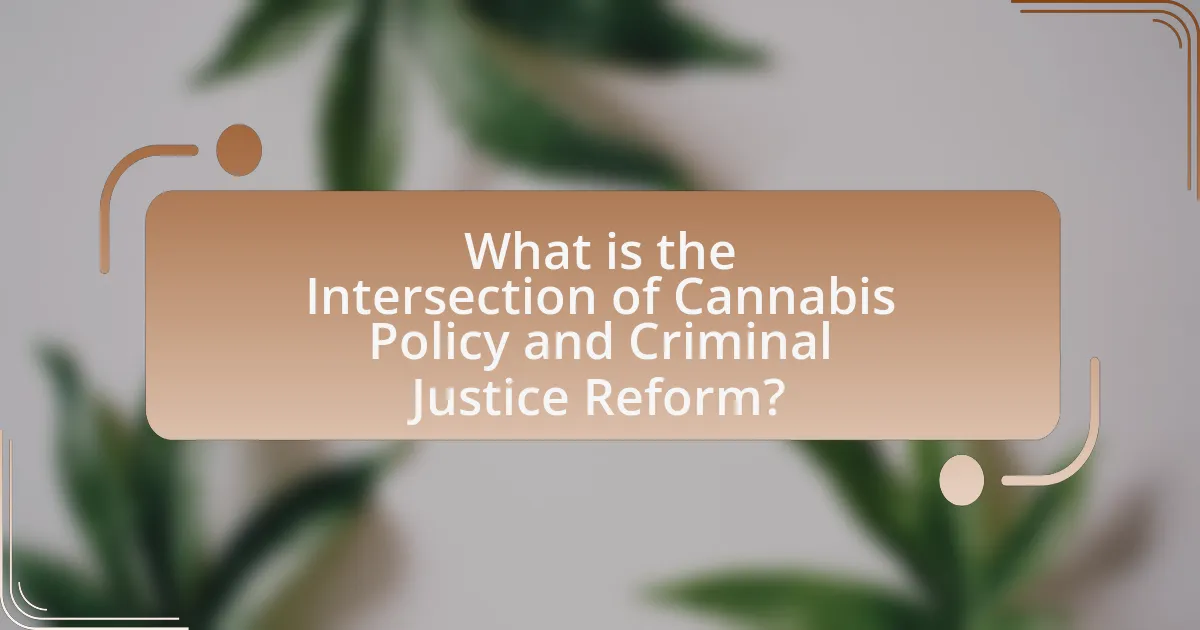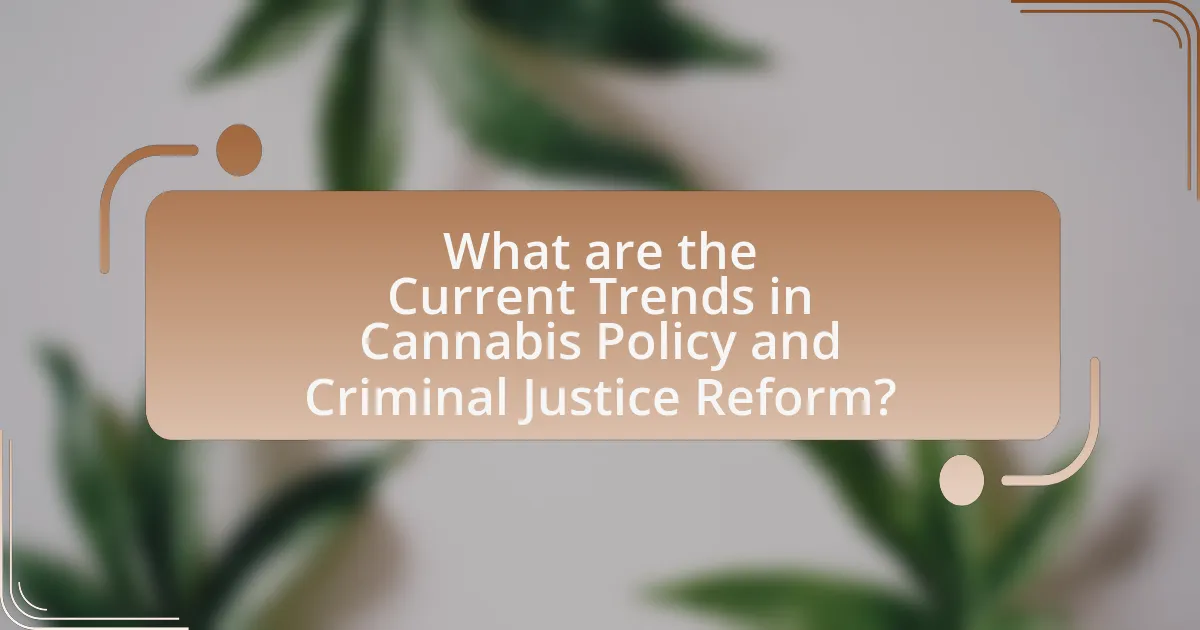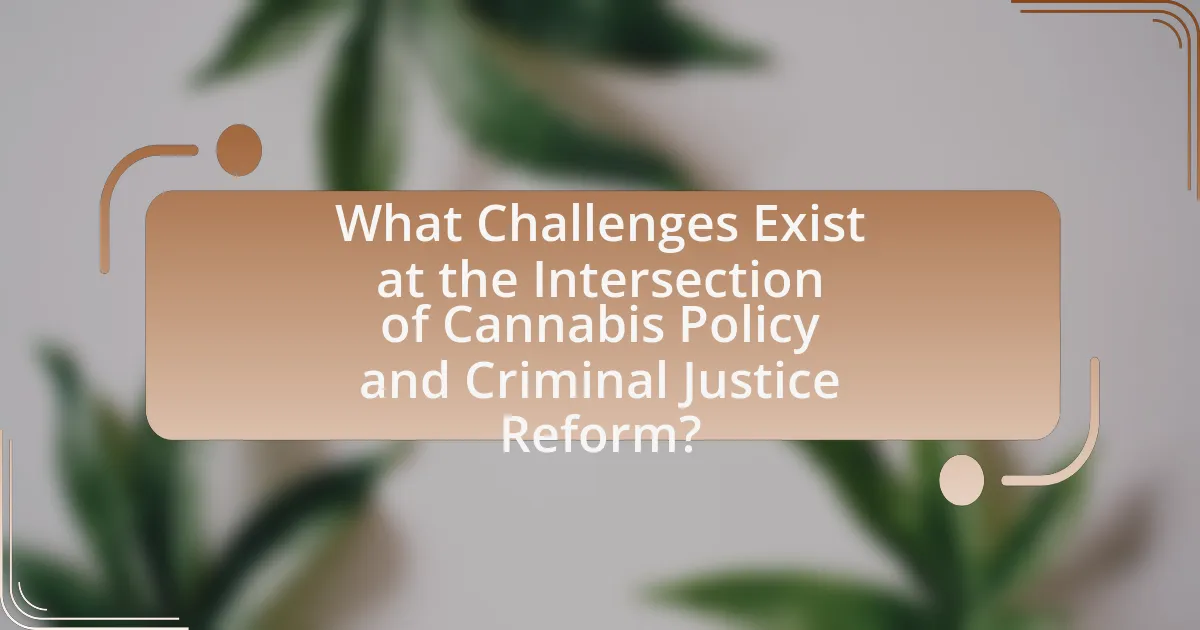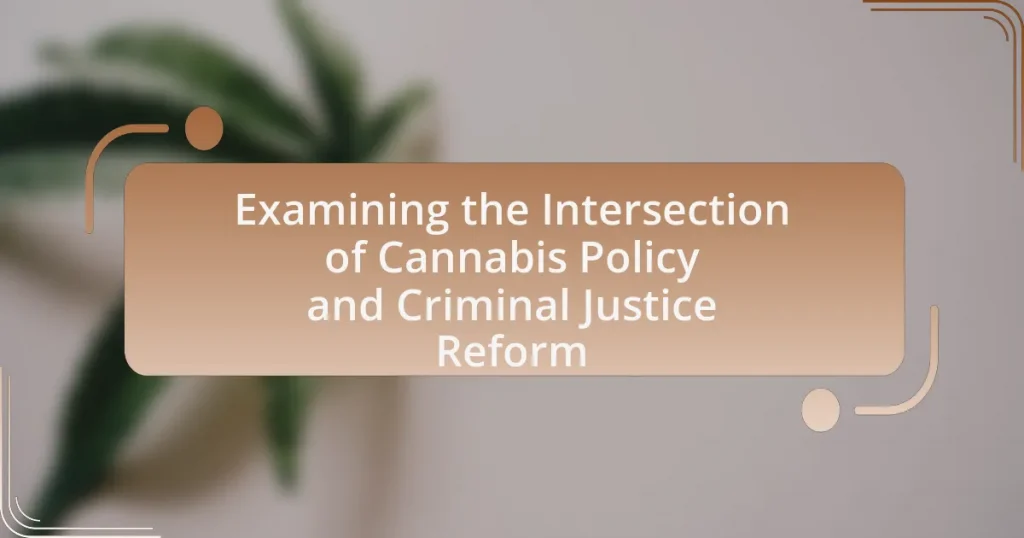The article examines the intersection of cannabis policy and criminal justice reform, highlighting the need for reevaluation of cannabis laws and their impact on marginalized communities. It discusses the historical context of cannabis criminalization, the significant reduction in arrest rates following legalization, and the ongoing disparities in enforcement that disproportionately affect Black individuals. The article also addresses current trends in cannabis policy, including legalization, decriminalization, and expungement initiatives, while emphasizing the role of advocacy groups in shaping public perception and policy change. Additionally, it outlines the challenges faced by reform advocates, including conflicts between state and federal laws, and proposes best practices for implementing equitable cannabis policies that promote social justice and reduce discrimination in enforcement.

What is the Intersection of Cannabis Policy and Criminal Justice Reform?
The intersection of cannabis policy and criminal justice reform involves the reevaluation of laws governing cannabis use and the impact these laws have on the criminal justice system. As states legalize cannabis, there is a growing movement to expunge past convictions related to cannabis offenses, which disproportionately affect marginalized communities. For instance, a report by the American Civil Liberties Union (ACLU) highlights that Black individuals are 3.64 times more likely to be arrested for cannabis possession than white individuals, despite similar usage rates. This disparity underscores the need for policy changes that not only legalize cannabis but also address the historical injustices within the criminal justice system.
How do cannabis policies impact criminal justice systems?
Cannabis policies significantly impact criminal justice systems by altering law enforcement practices, reducing incarceration rates, and shifting judicial resources. For instance, the legalization of cannabis in various states has led to a decrease in arrests for possession, with a report from the American Civil Liberties Union indicating that marijuana arrests dropped by over 80% in states that legalized recreational use. This reduction in arrests allows law enforcement to focus on more serious crimes, thereby reallocating resources within the criminal justice system. Additionally, the decriminalization of cannabis has contributed to a decline in the number of individuals incarcerated for drug-related offenses, which historically has disproportionately affected marginalized communities. As a result, cannabis policies not only reshape the landscape of law enforcement but also promote broader criminal justice reform by addressing systemic inequalities.
What are the historical contexts of cannabis laws in relation to criminal justice?
The historical contexts of cannabis laws in relation to criminal justice reveal a trajectory of criminalization and reform influenced by social, political, and economic factors. Initially, in the early 20th century, cannabis was largely unregulated until the Marihuana Tax Act of 1937, which effectively criminalized its use and set the stage for widespread enforcement against users and dealers, disproportionately affecting marginalized communities. The War on Drugs in the 1980s further intensified punitive measures, leading to mass incarceration and racial disparities in arrests and sentencing for cannabis-related offenses. Recent shifts towards legalization and decriminalization, particularly in the 21st century, reflect changing public attitudes and a growing recognition of the need for criminal justice reform, as evidenced by states like Colorado and California legalizing recreational use, which has prompted discussions on expunging past convictions and addressing the harms of previous enforcement practices.
How have changes in cannabis policy influenced arrest rates?
Changes in cannabis policy have significantly influenced arrest rates by reducing the number of arrests for cannabis-related offenses. For instance, states that have legalized recreational cannabis have seen a notable decline in arrests; for example, Colorado reported a 50% decrease in cannabis-related arrests following legalization in 2012. Additionally, jurisdictions that have decriminalized cannabis have experienced similar trends, with New York City reporting a 94% drop in marijuana arrests after decriminalization in 2019. These changes in policy reflect a broader shift towards treating cannabis use as a public health issue rather than a criminal one, leading to fewer individuals being processed through the criminal justice system for cannabis-related offenses.
Why is the reform of cannabis policy important for criminal justice?
The reform of cannabis policy is important for criminal justice because it addresses systemic inequalities and reduces the burden on the legal system. Historical data shows that cannabis prohibition has disproportionately affected marginalized communities, with studies indicating that Black individuals are nearly four times more likely to be arrested for cannabis-related offenses than white individuals, despite similar usage rates. Reforming cannabis policy can lead to decriminalization, which alleviates overcrowding in prisons and allows law enforcement to focus on more serious crimes, ultimately promoting a fairer and more equitable justice system.
What social justice issues are highlighted by cannabis criminalization?
Cannabis criminalization highlights several social justice issues, including racial disparities in enforcement, economic inequality, and the impact on marginalized communities. Research indicates that despite similar usage rates, Black individuals are disproportionately arrested for cannabis-related offenses compared to white individuals, with a 2013 ACLU report showing that Black people are nearly four times more likely to be arrested for cannabis possession. Additionally, criminalization perpetuates economic disadvantages, as individuals with criminal records face barriers to employment, housing, and education. This systemic inequality exacerbates existing social injustices, particularly affecting low-income and minority populations.
How does cannabis legalization affect marginalized communities?
Cannabis legalization positively affects marginalized communities by reducing incarceration rates and promoting economic opportunities. Studies indicate that legalization leads to a significant decrease in arrests for cannabis-related offenses, particularly among Black and Latino populations, who have historically faced disproportionate enforcement. For example, a report from the American Civil Liberties Union (ACLU) found that Black individuals are 3.64 times more likely to be arrested for cannabis possession than white individuals, highlighting systemic racial disparities. Furthermore, legalization creates job opportunities in the cannabis industry, which can benefit marginalized communities economically. In states like Colorado, data shows that minority-owned cannabis businesses have increased, contributing to local economies and providing pathways for wealth generation.

What are the Current Trends in Cannabis Policy and Criminal Justice Reform?
Current trends in cannabis policy and criminal justice reform include the legalization of recreational and medical cannabis in various states, decriminalization efforts, and the expungement of past cannabis-related convictions. As of 2023, 21 states and Washington D.C. have legalized recreational cannabis, reflecting a shift towards more progressive policies. Additionally, numerous jurisdictions are implementing measures to decriminalize possession and use, reducing penalties for non-violent offenses. Expungement initiatives are gaining traction, with states like California and Illinois actively working to clear records of individuals previously convicted of cannabis offenses, thereby addressing historical injustices and promoting social equity. These trends indicate a significant movement towards reforming outdated cannabis laws and rectifying the impacts of previous criminalization.
How are different states approaching cannabis legalization?
Different states are approaching cannabis legalization through a variety of methods, including full legalization, decriminalization, and medical use frameworks. For instance, states like California and Colorado have fully legalized recreational cannabis, allowing adults to purchase and use cannabis legally, while also implementing regulatory frameworks for cultivation and sales. In contrast, states such as New York have recently enacted laws to legalize recreational use, emphasizing social equity and expungement of past cannabis-related offenses. Additionally, states like Texas maintain strict prohibitions but have allowed limited medical use, reflecting a more conservative approach. According to the National Conference of State Legislatures, as of 2023, 21 states and Washington D.C. have legalized recreational cannabis, while 37 states permit medical cannabis, showcasing a significant shift in public policy and attitudes towards cannabis across the United States.
What models of cannabis policy reform are being implemented?
Various models of cannabis policy reform are being implemented, including legalization, decriminalization, and medical cannabis programs. Legalization allows for regulated production and sale of cannabis, as seen in states like Colorado and California, where tax revenues have increased significantly. Decriminalization reduces penalties for possession, which has been adopted in places like Oregon, leading to lower incarceration rates for minor offenses. Medical cannabis programs, such as those in Florida and New York, provide access to cannabis for patients with qualifying conditions, contributing to public health initiatives. These models reflect a shift towards more progressive cannabis policies aimed at reducing criminal justice involvement and promoting public health.
How do these models affect criminal justice practices?
Models of cannabis policy reform significantly affect criminal justice practices by altering enforcement priorities and reducing incarceration rates for drug-related offenses. For instance, jurisdictions that have implemented legalization or decriminalization models often see a shift in law enforcement focus from punitive measures to public health approaches, leading to fewer arrests for cannabis possession. A study by the American Civil Liberties Union (ACLU) found that states with legalized cannabis experienced a 20% decrease in drug arrests, demonstrating a direct impact on criminal justice practices. Additionally, these models promote the expungement of past cannabis convictions, further reforming the justice system by addressing historical inequities and reducing barriers to employment and housing for affected individuals.
What role do advocacy groups play in shaping cannabis policy?
Advocacy groups play a crucial role in shaping cannabis policy by influencing legislation, raising public awareness, and mobilizing community support. These organizations, such as the Marijuana Policy Project and the Drug Policy Alliance, actively lobby lawmakers to promote reforms that decriminalize cannabis and advocate for its medical and recreational use. For instance, in states like California and Colorado, advocacy groups were instrumental in the successful passage of legalization measures, demonstrating their effectiveness in swaying public opinion and legislative outcomes. Their efforts often include conducting research, disseminating information, and organizing grassroots campaigns, which collectively contribute to a more informed dialogue around cannabis policy and its implications for criminal justice reform.
How do these groups influence public perception and policy change?
Advocacy groups influence public perception and policy change regarding cannabis and criminal justice reform through strategic campaigns, education, and lobbying efforts. These organizations, such as the Drug Policy Alliance and NORML, utilize research and data to highlight the social and economic benefits of cannabis legalization, thereby shifting public opinion. For instance, a 2021 Gallup poll indicated that 68% of Americans support cannabis legalization, reflecting the impact of these advocacy efforts. Additionally, these groups engage in grassroots mobilization, encouraging community involvement and legislative action, which has led to significant policy changes in various states, such as the legalization of recreational cannabis in New York in 2021.
What strategies are effective in advocating for reform?
Effective strategies in advocating for reform include grassroots mobilization, coalition building, and data-driven advocacy. Grassroots mobilization engages community members to raise awareness and support for reform initiatives, as seen in successful campaigns for cannabis legalization in states like Colorado and California. Coalition building brings together diverse stakeholders, including advocacy groups, policymakers, and affected individuals, to create a unified front, exemplified by organizations like the Drug Policy Alliance. Data-driven advocacy utilizes research and statistics to highlight the benefits of reform, such as reduced incarceration rates and increased tax revenue from legalized cannabis, which has been documented in studies by the American Civil Liberties Union. These strategies collectively enhance the effectiveness of reform advocacy efforts.

What Challenges Exist at the Intersection of Cannabis Policy and Criminal Justice Reform?
Challenges at the intersection of cannabis policy and criminal justice reform include the ongoing criminalization of cannabis use, disparities in enforcement, and the need for regulatory frameworks that address past injustices. Despite legalization efforts in many states, individuals, particularly from marginalized communities, continue to face arrests and convictions for cannabis-related offenses, perpetuating systemic inequalities. According to the American Civil Liberties Union, Black individuals are 3.64 times more likely to be arrested for cannabis possession than white individuals, highlighting the racial disparities in enforcement. Additionally, the lack of a cohesive federal policy complicates state-level reforms, leading to confusion and inconsistency in legal standards. These challenges necessitate comprehensive approaches that not only reform cannabis laws but also address the broader implications for criminal justice and social equity.
What are the legal challenges faced by cannabis reform advocates?
Cannabis reform advocates face several legal challenges, primarily stemming from the conflict between state and federal laws. Despite many states legalizing cannabis for medical or recreational use, it remains classified as a Schedule I substance under the Controlled Substances Act at the federal level, creating legal risks for individuals and businesses involved in the cannabis industry. Additionally, advocates encounter obstacles such as restrictive banking regulations, which prevent cannabis businesses from accessing traditional financial services, and ongoing criminal penalties for cannabis-related offenses in jurisdictions where it remains illegal. These challenges complicate efforts to promote comprehensive reform and create a more equitable legal framework surrounding cannabis use and distribution.
How do federal laws conflict with state cannabis policies?
Federal laws conflict with state cannabis policies primarily because cannabis remains classified as a Schedule I substance under the Controlled Substances Act, making it illegal at the federal level. This classification contradicts the legalization and decriminalization efforts undertaken by numerous states, where cannabis is permitted for medical or recreational use. For instance, as of October 2023, over 30 states have legalized cannabis in some form, creating a legal landscape that directly opposes federal prohibition. This discrepancy leads to legal ambiguities, where individuals and businesses operating legally under state laws can still face federal prosecution, impacting banking, taxation, and interstate commerce related to cannabis.
What legal precedents impact cannabis-related criminal cases?
Legal precedents impacting cannabis-related criminal cases include the Supreme Court’s decision in Gonzales v. Raich (2005), which upheld the federal government’s authority to regulate marijuana under the Commerce Clause, even in states where it is legal for medical use. This ruling established that federal law can supersede state law regarding cannabis, affecting how criminal cases are prosecuted. Additionally, the case of United States v. Oakland Cannabis Buyers’ Cooperative (2001) reinforced the federal prohibition of marijuana, emphasizing that medical necessity does not exempt individuals from federal drug laws. These precedents shape the legal landscape for cannabis-related offenses, influencing both law enforcement practices and judicial outcomes.
How do societal attitudes towards cannabis affect reform efforts?
Societal attitudes towards cannabis significantly influence reform efforts by shaping public opinion, legislative priorities, and political will. When a majority of the population views cannabis use positively, it creates a conducive environment for policymakers to advocate for legalization or decriminalization, as seen in states like Colorado and California, where public support led to successful ballot initiatives. Conversely, negative perceptions can hinder reform, as evidenced by ongoing resistance in regions where stigma persists, resulting in stricter enforcement and limited legislative progress. Research from the Pew Research Center indicates that public support for cannabis legalization has increased from 32% in 2010 to 60% in 2019, demonstrating a direct correlation between changing societal attitudes and the advancement of reform efforts.
What misconceptions about cannabis contribute to resistance against reform?
Misconceptions about cannabis that contribute to resistance against reform include the belief that cannabis use leads to increased crime and addiction. Many opponents argue that legalizing cannabis will result in higher rates of substance abuse and criminal activity, despite studies indicating that cannabis legalization is associated with a decrease in opioid-related deaths and crime rates. For instance, a 2019 study published in the Journal of Economic Behavior & Organization found that states with legalized cannabis experienced a reduction in violent crime. Additionally, the misconception that cannabis is a “gateway drug” has been debunked by research showing that most cannabis users do not progress to harder substances. These misconceptions create a significant barrier to reforming cannabis policies and advancing criminal justice reform.
How can education and awareness campaigns change public opinion?
Education and awareness campaigns can change public opinion by providing accurate information and challenging misconceptions about cannabis use and its legal implications. These campaigns often utilize data-driven messaging, highlighting research that demonstrates the benefits of cannabis legalization, such as reduced incarceration rates and increased tax revenue. For instance, a study by the American Civil Liberties Union found that states with legalized cannabis have seen a significant decrease in drug-related arrests, which can shift public perception towards viewing cannabis as a less harmful substance. Additionally, personal stories shared in these campaigns can humanize the issue, fostering empathy and understanding among the public. By effectively communicating facts and personal narratives, education and awareness campaigns can significantly influence attitudes and beliefs regarding cannabis policy and its intersection with criminal justice reform.
What are the best practices for implementing effective cannabis policy reform?
The best practices for implementing effective cannabis policy reform include establishing clear regulatory frameworks, ensuring public health and safety measures, and promoting social equity. Clear regulatory frameworks provide guidelines for cultivation, distribution, and consumption, which can reduce illegal market activities; for instance, states like Colorado have successfully implemented such frameworks, resulting in significant tax revenue and reduced law enforcement costs. Public health and safety measures, such as age restrictions and quality control, protect consumers and mitigate health risks associated with cannabis use. Additionally, promoting social equity through policies that address past injustices, such as expunging criminal records for non-violent cannabis offenses, fosters community trust and rectifies historical disparities. Research from the American Civil Liberties Union highlights that Black individuals are disproportionately arrested for cannabis-related offenses, underscoring the need for equitable reform.
How can policymakers ensure equitable access to cannabis resources?
Policymakers can ensure equitable access to cannabis resources by implementing inclusive licensing processes that prioritize marginalized communities. This approach can be supported by data indicating that individuals from these communities have historically faced disproportionate impacts from cannabis prohibition. For instance, a report from the American Civil Liberties Union (ACLU) highlights that Black individuals are nearly four times more likely to be arrested for cannabis possession than white individuals, despite similar usage rates. By establishing grant programs, reducing application fees, and providing technical assistance, policymakers can facilitate entry into the cannabis market for those who have been adversely affected by past policies. Additionally, creating social equity programs that allocate a percentage of cannabis tax revenue to support community development initiatives can further promote equitable access.
What measures can be taken to prevent discrimination in enforcement?
To prevent discrimination in enforcement, implementing standardized training for law enforcement officers on implicit bias and cultural competency is essential. This training equips officers with the skills to recognize and mitigate their biases, thereby promoting equitable treatment across diverse communities. Research indicates that departments that have adopted such training programs have seen a reduction in biased policing practices. For instance, a study by the National Institute of Justice found that implicit bias training can lead to improved interactions between police and minority communities, fostering trust and reducing instances of discrimination. Additionally, establishing oversight mechanisms, such as independent review boards, can ensure accountability and transparency in enforcement actions, further deterring discriminatory practices.


